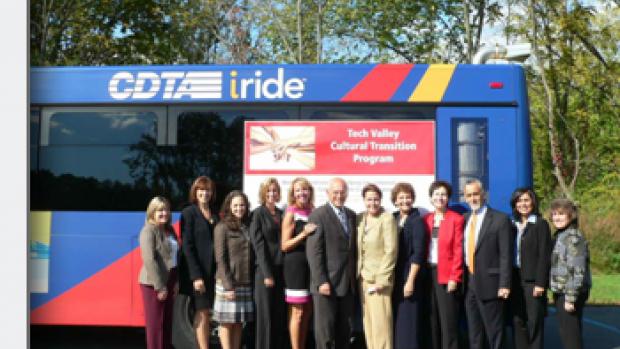
September 24, 2012
Tech Valley Connect Partnership Launches New Cultural Transition Program for Capital Region
TROY, NY – As a means to attract and retain businesses and key talent from around the world, Tech Valley Connect is launching a comprehensive Cultural Transition Program (CTP) to help the growing international community adapt to U.S. culture and the Capital Region. An important part of the region’s expanding infrastructure, this type of program will become a tool to help area employers with retention efforts as well as serve as a vital resource for incoming foreign nationals. The program, announced today, was created by Tech Valley Connect in partnership with eight Capital Region companies.
Partners in the venture include; Key Bank, Price Chopper, CDPHP, Times Union, Tri City Rentals, BBL Hospitality, CDTA and Tangible Development. “This unique collaboration is the foundation of a more supportive infrastructure for the international population of this region,” said Angela McNerney, president and CEO of Tech Valley Connect. “It was important to the partnership team that we raise the level of sophistication in the Capital Region in attracting global businesses key talent from many parts of the world.”
"Our region has been successfully redefined as a thriving technology economy and there remain many things to do to sustain this unprecedented growth. One thing is to not only anticipate the influx of talented professionals but to embrace it, especially the foreign nationals who will bring another dimension of quality to the Capital Region." said Michael Wacholder, chairman of Tech Valley Connect’s Board of Directors and retired director of the Rensselaer Technology Park.
The CTP will work with international newcomers on culture, customs, traditions, government, health care, education, and household information. It will serve as a regional hub of information in terms of connecting people with local ethnic resources, such as affinity groups, ethnic markets, restaurants, and provide learning opportunities geared toward the specific needs and interests of families who are coming from outside the United States. Veysel Ucan, executive director of the Turkish Cultural Center Albany said, “People have many difficulties and challenges when they move to a new culture. I believe the Cultural Transition Program is a great initiative to help the newcomers adapt to the American Culture and be a part of greater community. This program will be beneficial for individuals as well as organizations in many different ways.”
Tech Valley Connect is a leadership driven organization made up of area employers who are focused on retention efforts. Its services include dual-career support, family assimilation and now, cultural transition workshops. During the pilot phase of its program, the organization found that at least 20% of their professional hires were foreign nationals and they were spending a considerable amount of time helping those families. “We tried to locate relevant resources for these families, and quickly realized there were no comprehensive programs in place regionally to help an international population adapt to U.S. culture,” McNerney said. “With such vast and deep cultural differences, the lack of resources can have a direct impact on the retention of these original hires or on protecting their families from cultural isolation .”
The program launches at a time when the international population of the Capital Region is rapidly growing. The U.S Census Bureau reports that the rise in foreign nationals in the Capital Region has gone from 15,216 in 2000 to 58,307 by 2010. This includes Albany, Rensselaer, Schenectady, Saratoga, and Schoharie counties. More than 75% of these people are private waged and salaried workers. Those in management, business, science, and arts occupations make up more than 44%, and these same foreign nationals represent a household income that averages $51,599 -- a significant impact to the local economy.
